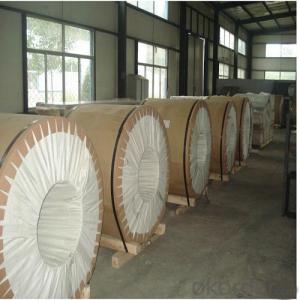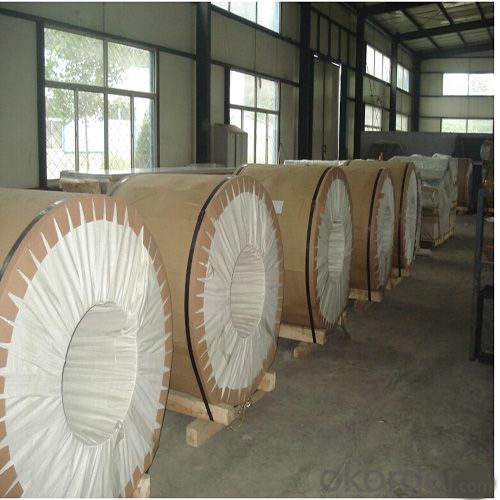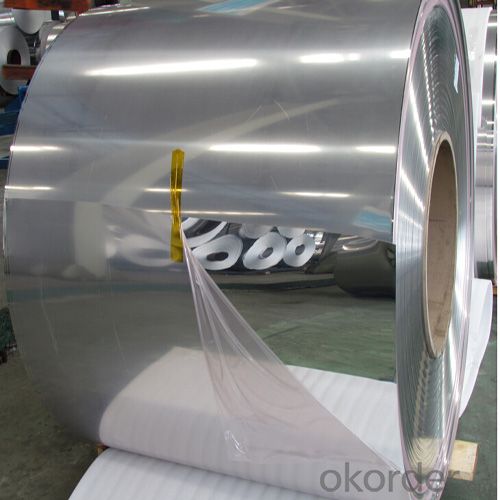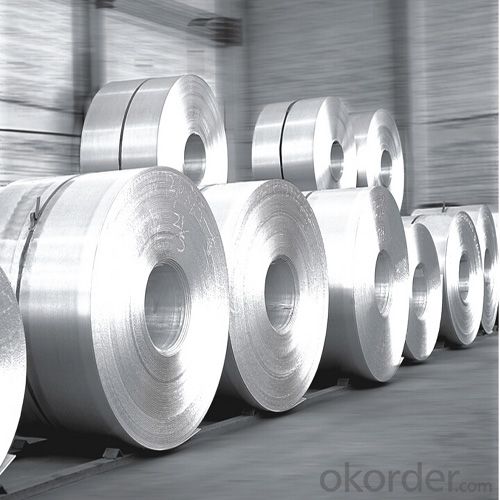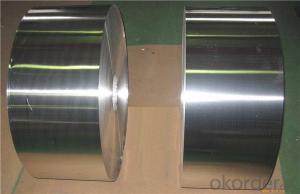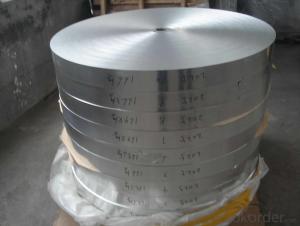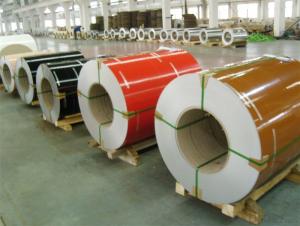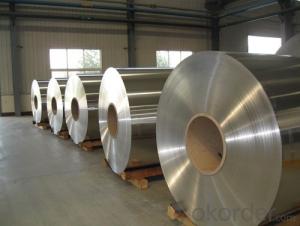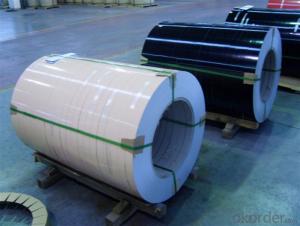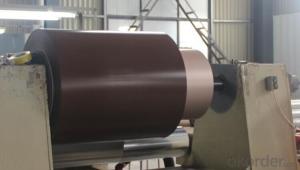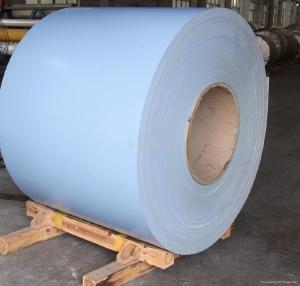Aluminum Coil Toronto - Anti-Rust High Strength 5454 Aluminum Coil for Oil Tank
- Loading Port:
- Shanghai
- Payment Terms:
- TT OR LC
- Min Order Qty:
- 5 m.t
- Supply Capability:
- 10000 m.t/month
OKorder Service Pledge
OKorder Financial Service
You Might Also Like
Specification
1.Structure of Anti-Rust High Strength 5454 Aluminum Coil Description:
Aluminum 5xxx alloy(5052, 5005, 5182, 5754, 5456 5083), 5xxx alloy has high corrosion resistance, good forming property, good welding performance, commonly used for decoration, automobile, marine service, fuel tank, can cover material, road signs etc.
Aluminum alloy 6061, 6063...6xxx alloy has high strength, good corrosion resistance, weldability, superior for oxidation, commently applied for construction, electron, mould making, extrusions, vehicle etc.Aluminum alloy 7050, 7075, 7xxx alloy is superduralumin, most suitable for aerospace equipment, machine and moulds.If you have requirement feel free to ask for quotation. We have competitive price especially for alloy 5052, 5005, 5182, 5754, 5456 5083 7050, 7075.
2.Main Features of Anti-Rust High Strength 5454 Aluminum Coil:
Good Corrosion Resistance
Good Machinability
High Quality
Competitive Price
3. Anti-Rust High Strength 5454 Aluminum Coil Images:
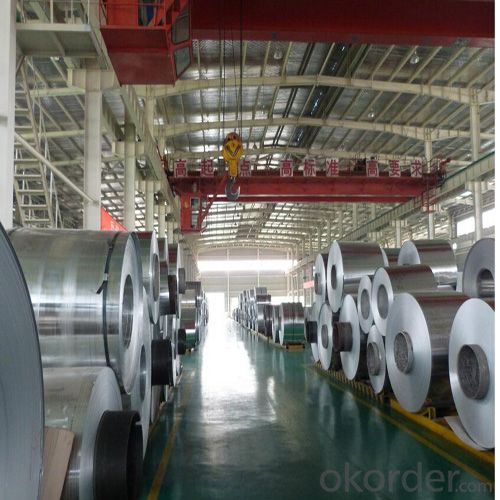
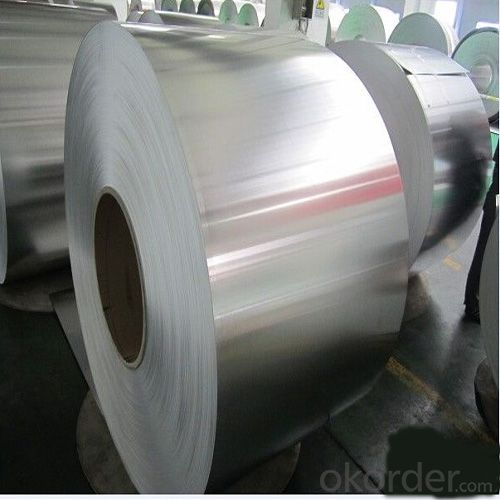
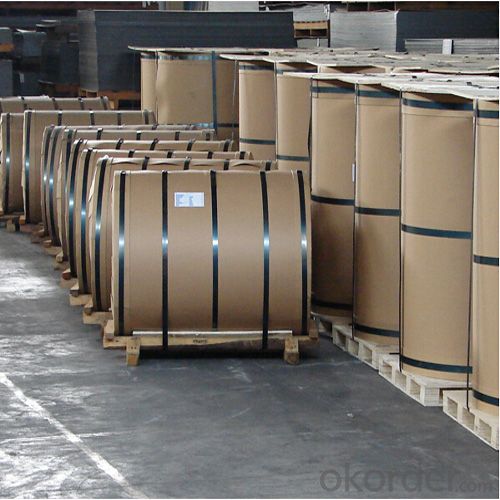
4. Anti-Rust High Strength 5454 Aluminum Coil Specification:
| Aluminium alloy | Si | Fe | Cu | Mn | Mg | Cr | Zn | Ti | others | Al | |
| per | all | ||||||||||
| 5454 | 0.25 | 0.4 | 0.1 | 0.5-1.0 | 2.4-3.0 | 0.05-0.2 | 0.25 | 0.2 | 0.05 | 0.15 | Remains |
5.FAQ
Q1.How long have you been in this product?
A1:More than 10 years.
Q2. What's the minium quantity(MOQ)?
A2. 5 Metric tons
Q3. How long is shipping time?
A3. 7 (ready-made products)-25 days(OEM)
Q4. How do you guarantee the quality?
A4. 1. Cooperating and Exchaning experience with sevral quoted aluminum companies
2. Japanese and Swiss production line and skilled works (regular training and testing)
3. more than 10 years production experience.
Q5. Do you have after sale service?
A5. Yes. Any quality problem occurs within one year, pls take photoes,we will be responsible.
- Q: This question asks about the environmental friendliness of aluminum coils.
- <p>Aluminum coils are considered environmentally friendly for several reasons. They are highly recyclable, with the recycling process requiring significantly less energy compared to producing new aluminum. This reduces greenhouse gas emissions and conserves resources. Additionally, aluminum is a non-toxic material that does not leach harmful substances into the environment. However, the environmental impact also depends on the production process, which can consume energy and generate emissions. Overall, when properly recycled, aluminum coils have a lower environmental footprint than many other materials.</p>
- Q: Are aluminum coils suitable for architectural roofing?
- Architectural roofing can benefit from the use of aluminum coils. Aluminum is widely used in construction due to its advantageous properties. Aluminum coils have multiple advantages for architectural roofing. Firstly, aluminum is lightweight, making it easier to handle and install. This is particularly useful for large-scale roofing projects where weight is a significant concern. Moreover, aluminum possesses excellent corrosion resistance. It naturally develops a protective oxide layer that defends against rust and other forms of corrosion. This ensures that aluminum coils are durable and long-lasting, allowing the roofing to endure various environmental conditions over time. Furthermore, aluminum is highly malleable, allowing for easy shaping into different roof profiles and designs. This grants architects and designers greater artistic freedom when creating visually appealing roofing systems. Another advantage of aluminum coils for architectural roofing is their reflective properties. Aluminum has a high solar reflectance, meaning it reflects a noteworthy amount of sunlight and heat away from the building. This aids in reducing cooling costs and improving energy efficiency, making it an environmentally friendly choice. Lastly, aluminum is a recyclable material, further enhancing its sustainability and making it a desirable option for architectural roofing. It can be easily recycled without losing its valuable properties, lessening the environmental impact of the construction industry. To conclude, aluminum coils are indeed suitable for architectural roofing due to their lightweight nature, corrosion resistance, malleability, reflective properties, and recyclability. These attributes make aluminum an excellent choice for roofing projects, offering durability, aesthetic appeal, energy efficiency, and environmental sustainability.
- Q: Can aluminum coils be painted?
- Yes, aluminum coils can be painted. Painting aluminum coils can provide an added layer of protection against corrosion and enhance their aesthetic appearance. However, it is important to properly prepare the surface before painting to ensure good adhesion and durability. This typically involves cleaning the coils thoroughly, removing any existing paint or coatings, and applying a primer specifically designed for use on aluminum surfaces. Once the primer has dried, a suitable paint can be applied using a brush, roller, or spray. It is recommended to use a high-quality paint specifically formulated for use on metal surfaces to ensure long-lasting results. Additionally, it is important to follow the manufacturer's instructions and consider any environmental factors that may affect the painting process, such as temperature and humidity.
- Q: What are the regulations and standards governing the production of aluminum coils?
- The regulations and standards governing the production of aluminum coils vary depending on the country and region. However, some common regulations and standards include those related to environmental protection, occupational health and safety, quality control, and product specifications. These regulations aim to ensure that the production process is carried out in a safe and sustainable manner, and that the produced aluminum coils meet the required quality and performance standards. Compliance with these regulations and standards is crucial for manufacturers to maintain the integrity and market acceptance of their products.
- Q: How do aluminum coils resist corrosion?
- Aluminum coils are able to resist corrosion due to their unique chemical composition and protective oxide layer. Aluminum is a highly reactive metal, but it forms a thin layer of aluminum oxide on its surface when exposed to air. This oxide layer acts as a protective barrier, preventing further reaction with the environment. This layer is self-repairing and continues to form even when it gets damaged, providing long-lasting protection against corrosion. Additionally, aluminum coils can be further protected by applying coatings or treatments that enhance their resistance to corrosion. These coatings act as an additional layer of defense, shielding the coils from potential corrosive agents. Overall, the combination of the natural oxide layer and optional coatings makes aluminum coils highly resistant to corrosion, ensuring their durability and longevity in various applications.
- Q: Are aluminum coils suitable for weather-resistant applications?
- Indeed, weather-resistant applications are well-suited for aluminum coils. Renowned for its exceptional corrosion resistance, aluminum remains a favored option for outdoor and weather-exposed uses. When in contact with air, the metal develops a safeguarding oxide layer on its surface, effectively shielding it from moisture, humidity, and other weather elements. This oxide layer plays a vital role in averting rust or degradation over time. Moreover, thanks to its lightweight nature and impressive strength-to-weight ratio, aluminum proves to be a pragmatic selection for an array of weather-resistant applications including roofing, gutters, siding, and outdoor signage.
- Q: This question asks for the current prices of aluminum coils, which may vary based on factors such as weight, thickness, and market conditions.
- <p>The prices of aluminum coils can vary significantly depending on several factors including weight, thickness, grade, and market demand. Prices are also influenced by global economic conditions and the current state of the commodities market. As of my last update, aluminum coil prices could range from a few dollars to several hundred dollars per pound, but for the most accurate and up-to-date pricing, it's best to check with a supplier or a commodities exchange, as these prices fluctuate regularly.</p>
- Q: Will the surface of aluminum contact water if the aluminum coil falls into water?
- You mean whether water will penetrate into the gap? If you get it out quickly, basically it will be ok. If there is something wrong, you can put it under the sun to see whether there is water oozing from the gap.
- Q: When they say to coat entire roof system with Aluminum coating, what does that mean? The area to coat is NOT the ceramic barrel tiles of a roof but the flat section covered with tar paper and granules of shiny sand. Is it a liquid? Clear? Good for the roof.? How is it applied?
- Why you would be coating a flat roof with Aluminum coating is beyond anything I have learned. Flat roofs should have a felt and tar coating to water proof them. Aluminum roof coating is used mostly on mobile homes to reflect heat because mobile homes don't have attics to trap the heat and carry it to vents. It also seals the water out at the metal seams. Aluminum coating is a type of polymer that has aluminum flakes in it. It is brushed on like a thick coat of paint and allowed to dry.
- Q: What are the advantages of using pre-painted aluminum coils?
- The utilization of pre-painted aluminum coils presents several benefits. To begin with, they provide a wide array of colors and finishes, allowing for greater design flexibility. This grants manufacturers and designers the ability to effortlessly match the desired color scheme or aesthetic of any project, be it for architectural applications, signage, or consumer products. Moreover, pre-painted aluminum coils exhibit exceptional resistance to corrosion and wear, making them ideal for outdoor applications. The paint coating acts as a protective layer, preventing the aluminum from oxidizing or deteriorating over time. This durability ensures that the coils can endure harsh weather conditions, UV radiation, and other environmental factors, thus extending their lifespan and reducing maintenance costs. Furthermore, pre-painted aluminum coils possess a combination of lightweight and strength, making them convenient to handle and install. This lightness also contributes to energy efficiency, as it requires less energy to transport and maneuver the coils during installation when compared to heavier materials. Another advantage of utilizing pre-painted aluminum coils lies in their sustainable nature. Aluminum is a highly recyclable material, and the pre-painted coating can be easily stripped off, allowing the aluminum to be recycled and reused. This promotes a circular economy and minimizes waste. Lastly, pre-painted aluminum coils prove to be cost-effective. The pre-painted coating eliminates the need for additional painting or finishing processes, saving time and reducing labor costs. Additionally, the long lifespan and low maintenance requirements of pre-painted aluminum coils result in lower overall costs compared to alternative materials that may necessitate more frequent repairs or replacements. In summary, the benefits of using pre-painted aluminum coils encompass design flexibility, corrosion resistance, durability, lightweight characteristics, sustainability, and cost-effectiveness. These advantages make pre-painted aluminum coils a favored choice across various industries and applications.
Send your message to us
Aluminum Coil Toronto - Anti-Rust High Strength 5454 Aluminum Coil for Oil Tank
- Loading Port:
- Shanghai
- Payment Terms:
- TT OR LC
- Min Order Qty:
- 5 m.t
- Supply Capability:
- 10000 m.t/month
OKorder Service Pledge
OKorder Financial Service
Similar products
Hot products
Hot Searches
Related keywords
